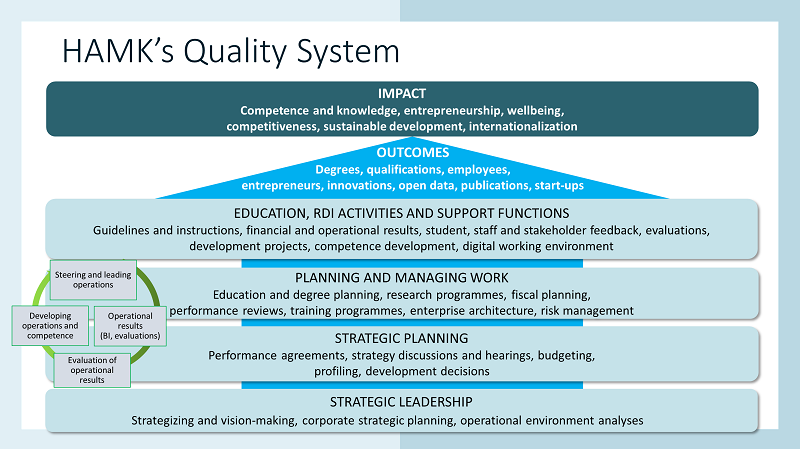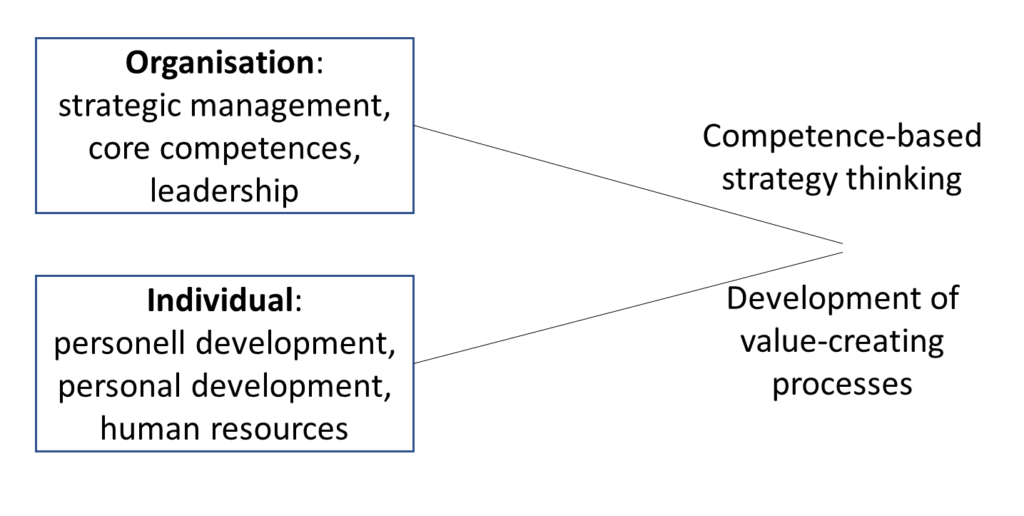A clear strategy serves as a roadmap for HAMK’s development plans
HAMK has a clear strategy, laid down in the Strategy 2030 document, which was developed in a participatory process led by the Board and the Rector’s team. It is published on HAMK’s webpage and outlines the institution’s strategic goals related to its core processes of education, RDI, societal impact and international cooperation. Strategic goals are translated into achievable and measurable objectives, the process towards achievement of the set goals is monitored through defined qualitative and quantitative indicators, as well as regular review processes at all organisational levels. Furthermore, a well-elaborated BI system supports the implementation of HAMK’S strategy.
Quality policy and Quality management form the backbone of HAMK’s quality work
HAMK’s Quality Management is firmly embedded into a quality framework of the pdca cycle; not only representing the Deming cycle, but according to the audit team’s experiences, also standing for people and policy, dialogue and development, commitment and collaboration and ambitions and actions as proprium of the institution.
The institution’s quality policy, which is publicly accessible on HAMK’s webpage, stipulates that quality means “doing the correct things right the first time” (sic). Thus, quality work at HAMK implies active use of the QMS tools, commitment of all staff to strategic and quality goals, and a constant “quality dialogue” across the institution as was confirmed in the interviews by staff and students. The staff recognise that the steady contribution to the further development of quality by everyone’s (daily) work is crucial for fulfilling the institution’s quality policy and strategic ambitions. Quality, as a shared responsibility, is a principle of HAMK’s mission, both as education provider and research partner.
Quality actors at all institutional levels, and their responsibilities, are clearly defined and transparently communicated to all stakeholders: the Rector of HAMK as head of the Quality Management Development Team, bears the overall responsibility of the institution’s quality system; the quality manager takes care of coordinating quality work at the different organisational levels such as Schools, Research units and Support services. Students have a strong voice in quality management (“we are heard” as student representatives mentioned in the interview), being part of various institutional bodies and through involvement in processes and feedback circles.
A system of multi-faceted QMS tools fosters strategic management and the profile of the institution
A well-designed BI system, management principles such as Management by Objectives (MBO), competence and knowledge management, clear processes, guidelines, and a comprehensive feedback system form the basis of HAMK’s Quality Management. The system, that has undergone a steady, long-term development since its first implementation, with decisive quality enhancement steps having been taken since the last audit, as mentioned in the self-evaluation report and in the interviews – focuses on three clearly formulated objectives: to foster the realisation of HAMK’s strategic goals and objectives, to ensure uniform operations throughout the institution and to support evaluation and improvement of operations.
Regular reviews of the system ensure that the institution’s quality management remains efficient and target oriented. The comprehensive information – data, results, and reports – which is provided by HAMK’s BI system, is systematically used in monitoring and evaluating strategic goals and testifies to the achievement of the set milestones. Monitoring is supported by an easily accessible and recently remodelled STARA 2.0 tool that transparently tracks the progress of tactical goals and objectives and visualises the progress of achievement. The management team confirmed the major value of this system and the information provided even though there is a tendency of data overload that may overlay analytical aspects necessary for improvement activities.
The various tools that HAMK has implemented into its QMS support has sharpened the institution’s profile as a recognised work-place -oriented Higher Education Institution, with special focus on competence and practice-orientation. Among these tools, which were appreciatively mentioned by internal and external stakeholders in the interviews, are, e.g., profiling, labour-market surveys, feedback from academic and industry partners, alumni, staff and students. Well prepared staff performance appraisals, which are done annually, are a useful and efficient way to link strategic objectives to personal tasks and needs and are highly valued, as the audit team learned in the interviews. The comprehensive feedback system ensures that input from internal and external stakeholders alike is captured for further development of quality and the quality system. The strong students’ voice in the institution’s quality dialogue was confirmed in the interviews.
In the interviews, staff from different units and levels confirmed that their work is guided by HAMK’s strategic goals and the institution’s quality policy principles. Quality issues have become a “set topic” in meetings at all levels, which underlines that quality and quality orientation are firmly incorporated in HAMK’s DNA. The audit team gained convincing evidence that HAMK uses its solid and well-developed Quality Management System both for strategic management and further development of the institution.

